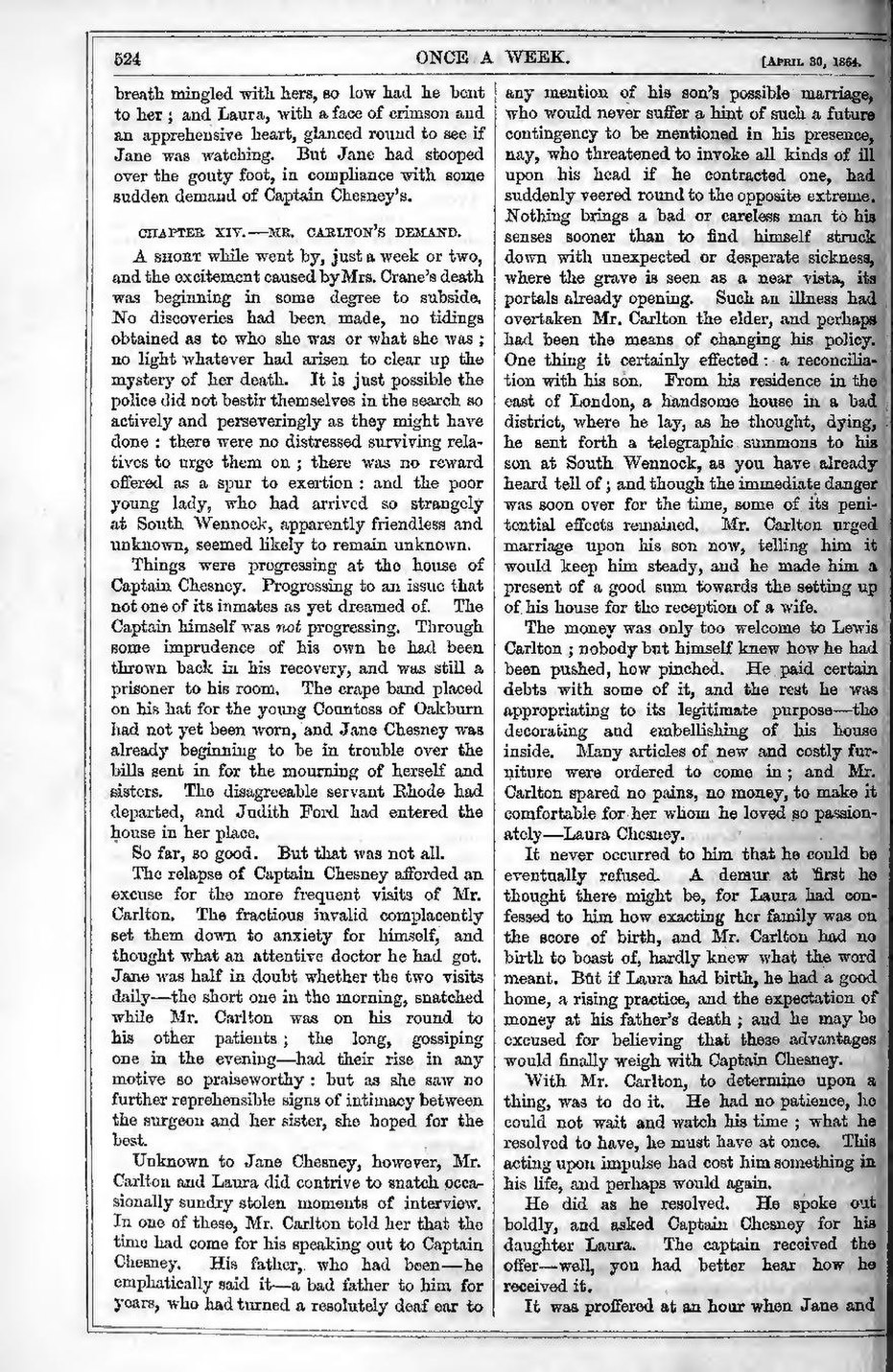breath mingled with hers, so low had he bent to her; and Laura, with a face of crimson and an apprehensive heart, glanced round to see if Jane was watching. But Jane had stooped over the gouty foot, in compliance with some sudden demand of Captain Chesney’s.
CHAPTER XIV.—MR. CARLTON’S DEMAND.
A short while went by, just a week or two, and the excitement caused by Mrs. Crane’s death was beginning in some degree to subside. No discoveries had been made, no tidings obtained as to who she was or what she was; no light whatever had arisen to clear up the mystery of her death. It is just possible the police did not bestir themselves in the search so actively and perseveringly as they might have done: there were no distressed surviving relatives to urge them on; there was no reward offered as a spur to exertion and the poor young lady, who had arrived so strangely at South Wennock, apparently friendless and unknown, seemed likely to remain unknown.
Things were progressing at the house of Captain Chesney. Progressing to an issue that not one of its inmates as yet dreamed of. The Captain himself was not progressing. Through some imprudence of his own he had been thrown back in his recovery, and was still a prisoner to his room. The crape band placed on his hat for the young Countess of Oakburn had not yet been worn, and Jane Chesney was already beginning to be in trouble over the bills sent in for the mourning of herself and sisters. The disagreeable servant Rhode had departed, and Judith Ford had entered the house in her place.
So far, so good. But that was not all.
The relapse of Captain Chesney afforded an excuse for the more frequent visits of Mr. Carlton. The fractious invalid complacently set them down to anxiety for himself, and thought what an attentive doctor he had got. Jane was half in doubt whether the two visits daily—the short one in the morning, snatched while Mr. Carlton was on his round to his other patients; the long, gossiping one in the evening—had their rise in any motive so praiseworthy: but as she saw no further reprehensible signs of intimacy between the surgeon and her sister, she hoped for the best.
Unknown to Jane Chesney, however, Mr. Carlton and Laura did contrive to snatch occasionally sundry stolen moments of interview. In one of these, Mr. Carlton told her that the time had come for his speaking out to Captain Chesney. His father, who had been—he emphatically said it—a bad father to him for years, who had turned a resolutely deaf ear to any mention of his son’s possible marriage, who would never suffer a hint of such a future contingency to be mentioned in his presence, nay, who threatened to invoke all kinds of ill upon his head if he contracted one, had suddenly veered round to the opposite extreme. Nothing brings a bad or careless man to his senses sooner than to find himself struck down with unexpected or desperate sickness, where the grave is seen as a near vista, its portals already opening. Such an illness had overtaken Mr. Carlton the elder, and perhaps had been the means of changing his policy. One thing it certainly effected: a reconciliation with his son. From his residence in the east of London, a handsome house in a bad district, where he lay, as he thought, dying, he sent forth a telegraphic summons to his son at South Wennock, as you have already heard tell of; and though the immediate danger was soon over for the time, some of its penitential effects remained. Mr. Carlton urged marriage upon his son now, telling him it would keep him steady, and he made him a present of a good sum towards the setting up of his house for the reception of a wife.
The money was only too welcome to Lewis Carlton; nobody but himself knew how he had been pushed, how pinched. He paid certain debts with some of it, and the rest he was appropriating to its legitimate purpose—the decorating and embellishing of his house inside. Many articles of new and costly furniture were ordered to come in; and Mr. Carlton spared no pains, no money, to make it comfortable for her whom he loved so passionately—Laura Chesney.
It never occurred to him that he could be eventually refused. A demur at first he thought there might be, for Laura had confessed to him how exacting her family was on the score of birth, and Mr. Carlton had no birth to boast of, hardly knew what the word meant. But if Laura had birth, he had a good home, a rising practice, and the expectation of money at his father’s death; and he may be excused for believing that these advantages would finally weigh with Captain Chesney.
With Mr. Carlton, to determine upon a thing, was to do it. He had no patience, he could not wait and watch his time; what he resolved to have, he must have at once. This acting upon impulse had cost him something in his life, and perhaps would again.
He did as he resolved. He spoke out boldly, and asked Captain Chesney for his daughter Laura. The captain received the offer—well, you had better hear how he received it.
It was proffered at an hour when Jane and